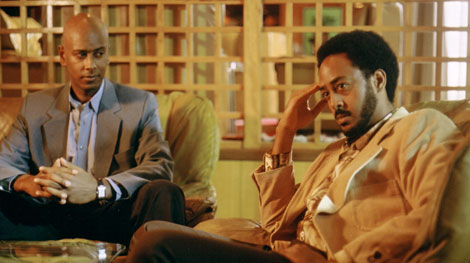Haile Gerima's 'Teza', from Ethiopia, wins Africa's Golden Yennenga Stallion
 In the heat of Bollywoods' renewal, it is interesting to read of the Fespaco Film Awards In Ouagadougou in Burkina Faso, where Ethiopian Haile Gerima has continued the film's awards success, nabbing the top African film prize, for his feature Teza. It tells of the disillusionment of a young Ethiopian who returns from his studies in Germany to question his beliefs amidst a country under the brutal rule of Haile Mariam Mengistu.
In the heat of Bollywoods' renewal, it is interesting to read of the Fespaco Film Awards In Ouagadougou in Burkina Faso, where Ethiopian Haile Gerima has continued the film's awards success, nabbing the top African film prize, for his feature Teza. It tells of the disillusionment of a young Ethiopian who returns from his studies in Germany to question his beliefs amidst a country under the brutal rule of Haile Mariam Mengistu.
(from BBC online) At the end of the week-long Fespaco film awards in hot, dusty Ouagadougou, Burkina Faso, the BBC's James Copnall looks back at the films on show, and the delights and gripes of participants, at the event sometimes described as Africa's answer to the Oscars.
Teza, by the Ethiopian Haile Gerima, was an extremely popular winner of the Golden Yennenga Stallion - African film's top prize. A roar went around the 4th August Stadium in Ouagadougou when the prize was announced at the closing ceremony.
The film's main character, Anberber, heads to Germany to pursue his studies.
|
Khalid Benaissa
Winner of best short film for Sektou (They have Stopped Talking)  |
"Contemporary reality continues to interfere, with silent violence as well as obvious violence," the director Haile Geriem said recently.
Anberber comes to question his revolutionary ideals. He also faces an identity crisis derived from the "displacement between the village and the modern world", according to the director.
Compelling
The movie delighted film industry insiders and ordinary people alike.
|
|
"It tells you about Ethiopia from the 1970s to now," the Moroccan director Ahmed Boulane said. "It's well told and well produced. It's a great African film."
The judges agreed, praising the film's content and style, and deciding unanimously it was Africa's best.
Mr Geriem's sister Salome picked up the heavy gold trophy - of a horseman mounted on a rearing stallion - on his behalf.
A small storm of photographers, journalists and cameramen surrounded her, and she let out a few words of happiness before the festival organisers hustled her away.
Other winners had the opportunity to be more effusive.
'Very happy'
Khalid Benaissa, a young Algerian with a goatee beard, jumped up and down on the podium as he picked up his prize, for best short film.
Mr Benaissa's Sektou, or They have Stopped Talking, was a beautifully shot film exploring the comedy and tragedy of living in Algeria.
"I am very, very happy," Mr Benaissa said, looking just that. "It's very important to me.
"This is an African film - the filming was done in Tunisia, it was developed in Morocco, my heart is Algerian, and it was made into my first film in 35mm because I was coming to Fespaco here in Burkina Faso,"
Leila Kilani's Nos Lieux Interdits - Our Forbidden Places - won best documentary. Like several films here - in particular ones from South Africa - it explored the process of reconciliation.
In this case the subject matter was the fight for justice of the families of the many people killed by the Moroccan state in the 1970s and 1980s.
Firemen
Leila Kilani was not present, so the daughter of her compatriot Nabil Ayouch picked up the prize, charming the crowd.
|
|
It was a totally unexpected display - the firemen were apparently in town to celebrate the 30th anniversary of the Burkinabe fire service.
The opening ceremony a week earlier was even more colourful.
A procession of three-metre (10ft) tall puppets, each piloted by a half-hidden man, circled the stadium.
Dancers followed a troupe of men and women dressed like American cowboys, who strolled along with comical bow legs.
A group of comedians pretended to film the action on fake cameras.
Hitches
But the real business was the films on show.
Film professionals, Burkinabes and visitors from all around the world watched movies all week.

The opening ceremony was spectacular
|
The director Mama Keita, who won Best Screenplay for L'Absence, complained you could hardly see his film in the Neerwaya, the main cinema.
Other directors - and journalists and critics - shuddered at the organisation. Some people had not even received their accreditation by the end of the week, and directors often said they were unsure when their film was to be shown.
"It's worse than it has ever been," was often heard around the pool at the Hotel Independence, where the directors stay.
Lack of funding
Thankfully it was not true of the films.
Teza was head and shoulders above the rest, but the overall quality of the films in competition was good.
Masquerades, an Algerian comedy about a beautiful woman with Narcolepsy, got the biggest laughs.
Several powerful South African films explored life during and after apartheid.
But one thing seems clear. Aside from the exceptional Teza, at the moment the best African films are being made in North Africa and South Africa.
The rest of the continent's movies are not as well funded, and it shows.
But as the fireworks illuminated the Ouagadougou sky, Africa's directors could reflect on Fespaco's great merit: presenting their vision to the world.